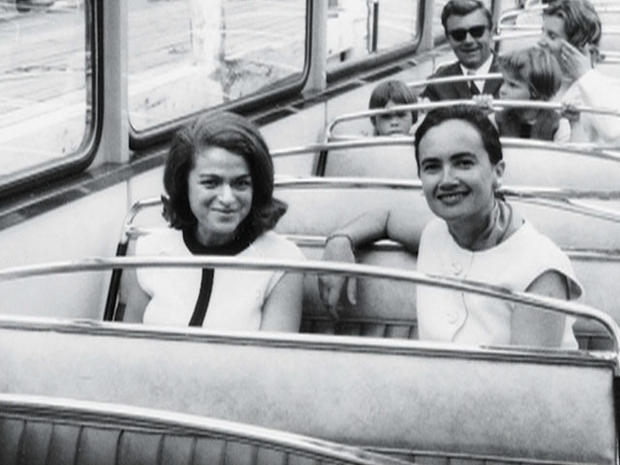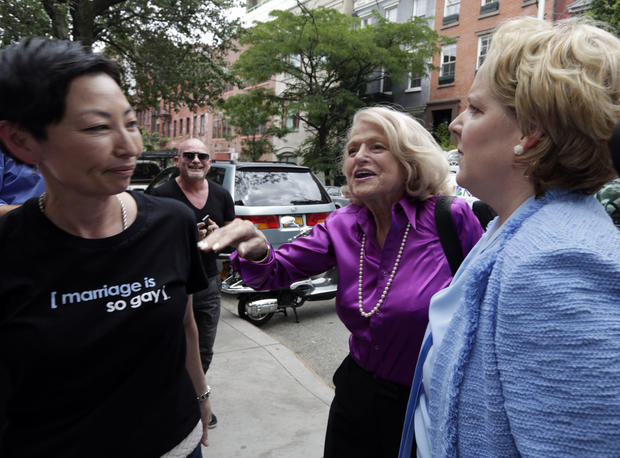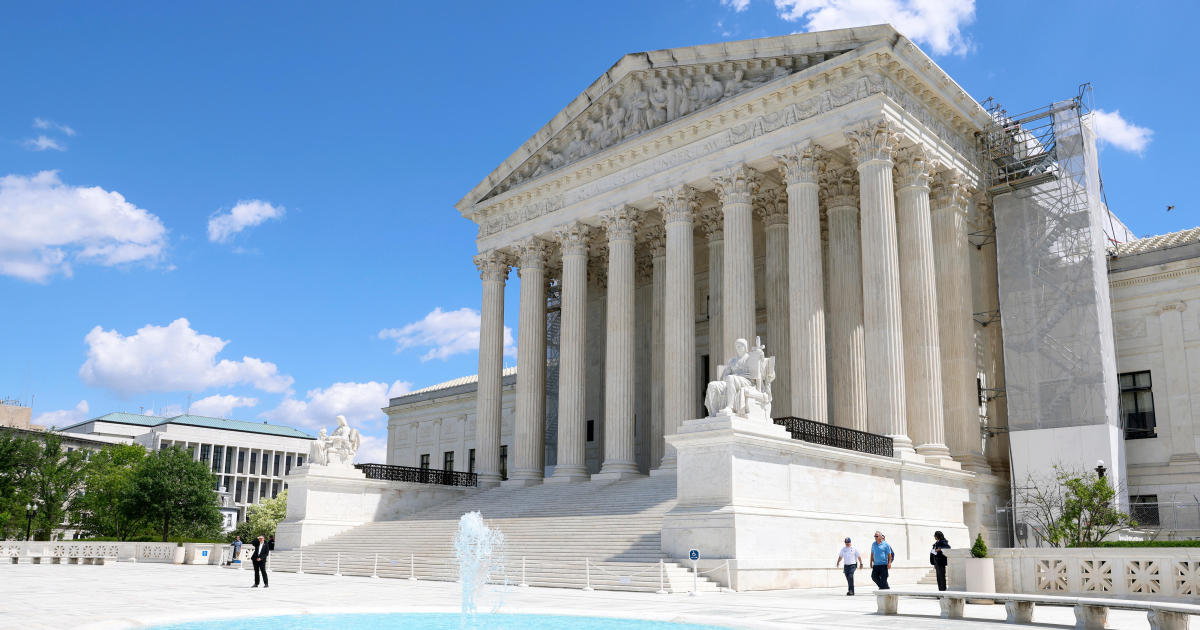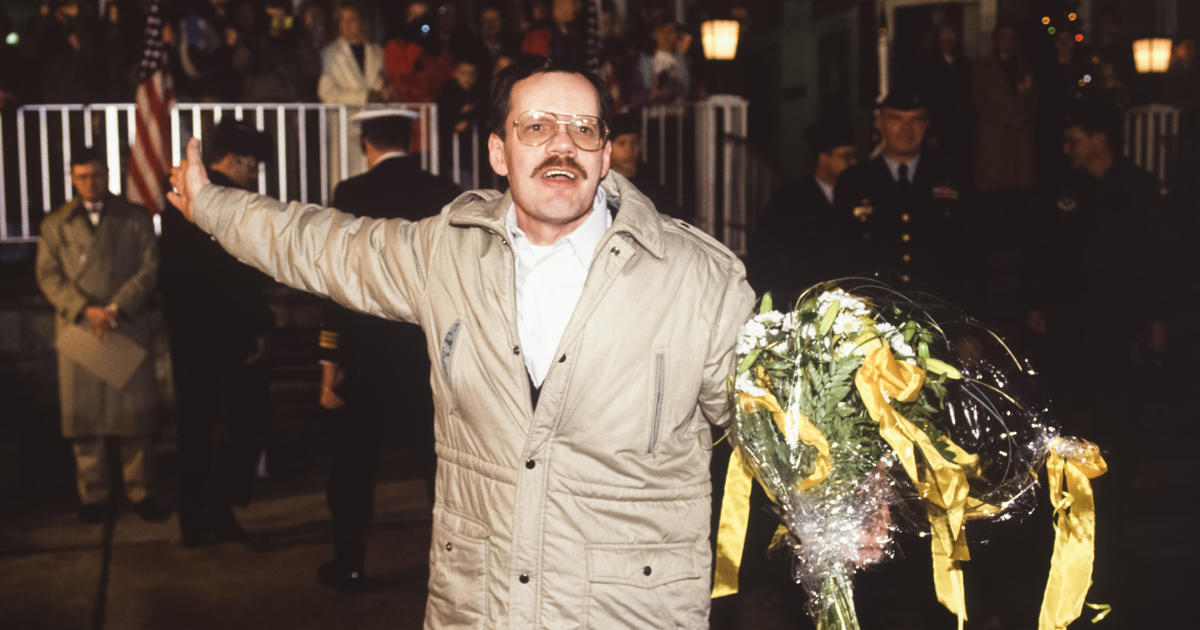Edith Windsor, plaintiff in landmark same-sex marriage case, dead at 88, lawyer says
Edith Windsor, the plaintiff in the landmark Supreme Court case that struck down the Defense of Marriage Act, has died, her lawyer confirmed to The Associated Press.
She was 88.
Windsor died in New York, said her lawyer, Roberta Kaplan. The cause of death wasn't given, but Windsor had struggled with heart issues for years.
"The world lost a tiny but tough-as-nails fighter for freedom, justice and equality," said her current spouse, Judith Kasen-Windsor. They married last year.
Former President Obama, who called to congratulate Windsor when the Supreme Court struck down DOMA, said in a statement that he had spoken to Windsor a few days ago.
"The day that the Supreme Court issued its 2013 ruling in United States v. Windsor was a great day for Edie, and a great day for America — a victory for human decency, equality, freedom, and justice. And I called Edie that day to congratulate her," Mr. Obama said.
In a statement, the American Civil Liberties Union called Windsor "one of this country's great civil rights pioneers."
"One simply cannot write the history of the gay rights movement without reserving immense credit and gratitude for Edie Windsor," ACLU executive director Anthony Romero said. "We were proud to stand with Edie when she took her fight on behalf of same-sex couples everywhere to the Supreme Court."
Windsor became a gay rights pioneer after her first spouse, Thea Spyer, died in 2009. The women had married legally in Canada in 2007 after spending more than 40 years together.
Windsor sued the federal government after Spyer's death, saying its definition of marriage as a relationship between a man and a woman prevented her from getting a marital deduction on Spyer's estate. That meant she faced a huge tax bill that heterosexual couples would not have.
When Spyer died, she left her estate to Windsor, and the federal government said Windsor owed $363,000 in inheritance taxes because Windsor, under federal law, was not considered married.
Windsor told CBS News' Jan Crawford in 2013 that "if Thea's name had been Theo, I would have paid no taxes."
The U.S. Supreme Court ruled 5-4 in June 2013 that the provision in the law was unconstitutional, and that legally married same-sex couples are entitled to the same federal benefits that heterosexual couples receive.
The opinion gave the nation's legally married gay couples equal federal footing with all other married Americans and marked a key moment of encouragement for gay marriage supporters confronting the nationwide patchwork of laws that, at the time, outlawed such unions in roughly three dozen states.
It also affronted conservatives who hewed to defining marriage as between a man and a woman. Then-Supreme Court Justice Antonin Scalia predicted the ruling would be used to upend state restrictions on marriage and warned: "The only thing that will 'confine' the court's holding is its sense of what it can get away with."
Ultimately, the opinion in Windsor's case became the basis for the wave of federal court rulings that struck down state marriage bans and led to a 2015 Supreme Court ruling giving same-sex couples the right to marry.
Windsor was born in Philadelphia and moved to Manhattan in the early 1950s after a brief marriage to a man that ended after she told him she was gay. She received a master's degree in mathematics from New York University in 1957 and went to work for IBM in senior technical and management positions.
Windsor met Spyer in the 1960s in Manhattan. They dated two years and then, Windsor says, made a commitment.
"I said, 'If it goes like this, I think I would like to be engaged for a year, and if that still works and feels this joyous, then I think I'd like to get married and spend the rest of my life with you,'" Windsor recalled to Crawford.
Spyer proposed marriage in 1967, according to The New York Times. They were on vacation in Italy when the Stonewall riots — a turning point for gay rights — had occurred. It was a turning point for Windsor too.
"Until then, I'd always had the feeling — and I know it's ignorant and unfair — 'I don't want to be identified with the queens,' " Ms. Windsor told NYU Alumni Magazine in 2011, according to the Times. "But from that day on, I had this incredible gratitude. They changed my life. They changed my life forever."
The pair stayed engaged for 40 years. They held out hope they would eventually get married — especially after Spyer was diagnosed with multiple-sclerosis in 1977. In 2007, Spyer was given a year to live and they married in Canada.
"'Marriage' is a magic word," Windsor said on the steps of City Hall at a rally for marriage equality, with Spyer at her side in her chair, according to a 2015 New Yorker profile. "Thea looks at her ring every day, and thinks of herself as a member of a special species that can love and couple 'until death do them part.'"





